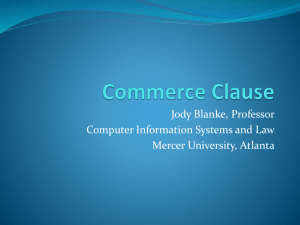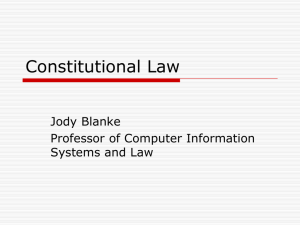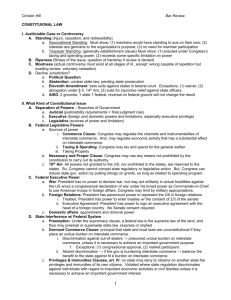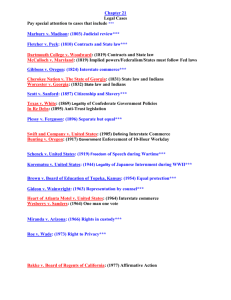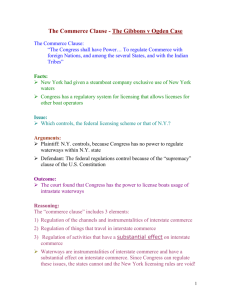Constitutional Law - Mercer University
advertisement
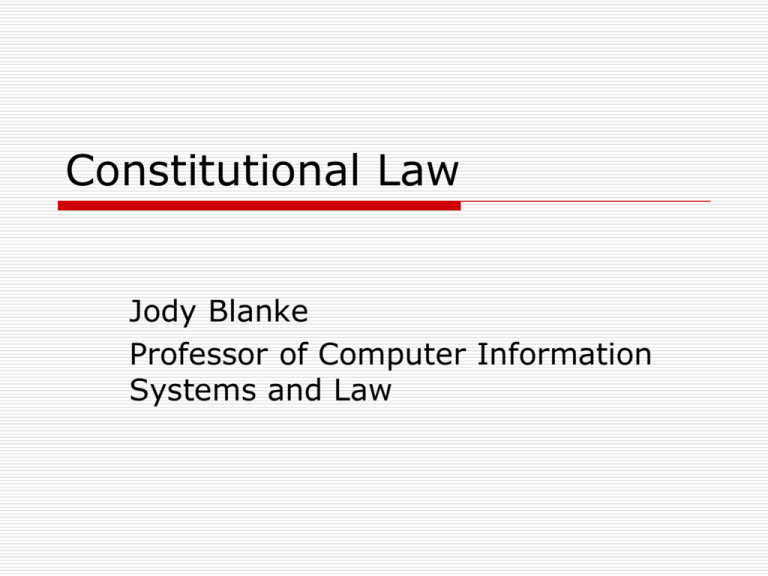
Constitutional Law Jody Blanke Professor of Computer Information Systems and Law The Constitution Separation of Powers Art. 1 – The Legislative Branch Art. 2 – The Executive Branch Art. 3 – The Judicial Branch Checks and Balances The Enumerated Powers Clause Art. 1 Sec. 8 of the Constitution Authorizes Congress to collect taxes to coin money to establish a postal system to raise and support Armies to provide and maintain a Navy to regulate interstate commerce to protect the writings of authors and the discoveries of inventors Preemption If Congress is authorized to make law, and does so with the intent that it be the only law, that law will preempt any state law Preemption Figure A Ex. FAA Ex. Patent Act Figure B Ex. Cipollone (1993) Ex. Silkwood (1984) Ex. Federal AntiSpam Act 1st and 14th Amendments 1st Amendment “Congress shall make no law …” 14th Amendment “No State shall make or enforce any law which shall …” Most protections/restrictions apply to both federal and state governments State Action Public vs. private The Fourteenth Amendment prohibits states from certain discriminatory behavior Citadel case (1995) school can have a males-only admissions policy as long as it receives no public funding Augusta National Golf Club Moose Lodge v. Irvis (1972) Issuance of liquor license is not state action Commerce Clause The interpretation by the Supreme Court of the scope of the commerce clause has changed dramatically over the years Early on, the interpretation was fairly broad Gibbons v. Ogden (1824) Congress, rather than New York, had the authority to regulate steamboats on the Hudson River Commerce Clause With the advent of the Industrial Revolution and Big Business, the interpretation narrowed considerably Hammer v. Dagenhart (1918) The Court refused to let Congress regulate with “social legislation,” e.g., child labor laws Commerce Clause New Deal legislation pushed by F.D.R. and passed by the Congress was struck down by the Supreme Court in several 5-4 decisions Schechter Poultry (1935) Congress lacked the power to regulate intrastate poultry processing activity The “Court Packing” Incident Why not have 13 Supreme Court justices? Commerce Clause Supreme Court finally permits Congress to regulate intrastate activity if it effects interstate commerce (in 5-4 decisions) Jones of Laughlin Steel Corp. (1937) Wickard v. Filburn (1942) intrastate activity may have a cumulative effect on interstate commerce Commerce Clause Supreme Court upheld the constitutionality of the Civil Rights Act of 1964 on the basis of interstate activity Heart of Atlanta Motel v. U.S. (1964) motel catered to interstate travelers Katzenbach v. McClung (1964) restaurant served food that was part of interstate commerce Commerce Clause Supreme Court finally draws an outer boundary to interstate activity U.S. v. Lopez (1995) Gun-Free School Zone Act U.S. v. Morrison (2000) Violence Against Women Act Dormant Commerce Clause State laws cannot unduly burden interstate commerce Georgia would not be able to require all restaurants in the state to serve only dairy products from Georgia dairy farms Maine v. Taylor (1986) But, Maine was permitted to ban the importation of live bait fish Freedom of Speech Political speech great deal of protection, but not absolute ex. ex. ex. ex. dangerous speech fighting words defamation obscenity Commercial Speech can be regulated for aesthetics Cincinnati v. Discovery Network (1993) Freedom of Religion Free Exercise Clause great deal of protection, but not absolute ex. human sacrifice Establishment Clause separation of church and state school prayer “In God We Trust” The Pledge of Allegiance The Ten Commandments Eminent Domain Poletown v. Detroit (1981) GM wanted to keep 6,000 jobs in Detroit Poletown was 465 acres, had 4,200 residents, 1300 homes, 140 businesses, 6 churches, 1 hospital Poletown v. Detroit Poletown v. Detroit Poletown 1961 Poletown 1997 Chattanooga, Baltimore Kelo v. New London (2005) 90-acre development plan 115 privately owned properties U.S. Supreme Court 5-4 decision Ballad of Suzette Kelo Equal Protection Can a state ever pass a law that treats black people differently than white people? Rational Basis Test Strict Scrutiny Test Intermediate Scrutiny Equal Protection Rational Basis Test applies if no suspect class or fundamental liberty interest is involved i.e., a good reason State v. Ri-Mel (1987) Minnesota required all for-profit health clubs to post a bond – no such requirement for not-for-profit health clubs Equal Protection Strict Scrutiny Test applies if a suspect class or fundamental liberty interest is involved, e.g., race or religion there must be a “compelling state interest” i.e., a very, very, very good reason Affirmative action Grutter v. Bollinger (2003) – U. Mich. Law School Gratz v. Bollinger (2003) – undergraduate Fisher v. University of Texas (2013) Equal Protection Intermediate Level Scrutiny applies to protected class, i.e., not quite a suspect class, e.g., gender or age classification must be “reasonably related” to legitimate government purpose i.e., a very, very good reason Craig v. Boren (1976) Oklahoma law prohibited the sale of 3.2% beer to males under 21 and females under 18 .18% of females and 2% of 18-20-year olds were arrested for DUI
